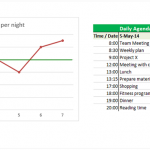Multitasking – is it really good for you?
Multitasking is part of our daily lives. From the driver who is paying attention to the traffic and answering passengers’ inquiries while listening to the music, to the employee who is answering a phone call while screening a report, we all need to perform more activities in the same time. Multitasking is a necessity, but what impact does it have on our personal performance?
Multitasking basically means simultaneously engaging in a number of tasks, but also performing multiple tasks sequentially and in a quick succession, changing the focus from one task to another. This implies spending some time switching between tasks, and some effort to divert attention from one activity to another. Various studies have focus on this subject, but a consensus on the usefulness of multitasking is yet to be reached. While multitasking was a popular subject among HR professionals who argued that it can lead to increased productivity, recent studies have shown that the costs might actually surpass its benefits.
The problem is that, when trying to multitask, a mental cost has to be paid. It seems that there is some kind of ‘’control switch’’ that shifts the cognitive system from focusing on one task to another. Recent estimates now claim that up to 40% of the productivity can be lost if heavily multitasking. But this is just one side of the story. As we come across large amounts of information, coming simultaneously from various sources, the cognitive system is “adapting”, learning to focus on the essential. This is the conclusion of a study performed by Kelvin Lui and Alan Wong, from The Chinese University of Hong Kong.
However, switching focus can be learnt, and the efficacy of multitasking can increase if the tasks performed are familiar and relatively not complicated. Although multitasking certainly has its costs, it has become a necessity. Time management and productivity tools should be used in order to reduce the negative effects of multitasking and ensure that all tasks are accomplished on time and at the desired level.
References:
- Dzubak, C. M. (2012), Multitasking: The good, the bad and the unknown, Pennsylvania State University York
- Lui, K. and Wong, A. (2012), Does media multi-tasking always hurt? A positive correlation between multitasking and multisensory integration, Psychonomic Bulletin & Review
- American Psychological association (2006), Multitasking: Switching costs
Image source

Tags: Kelvin Lui, Multitasking






